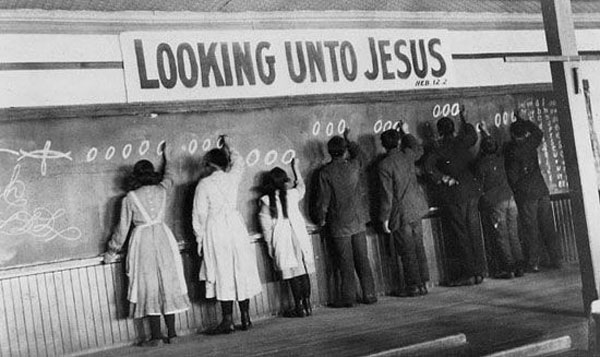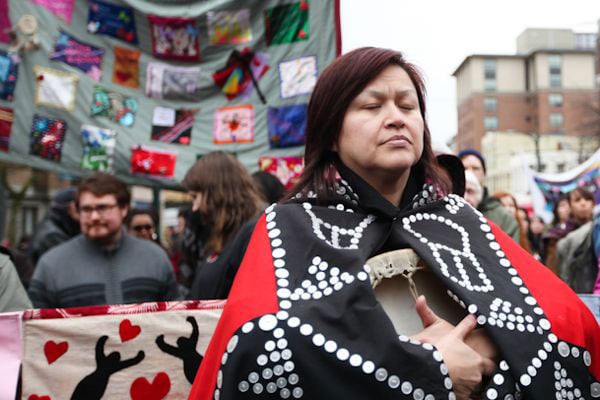Organizers of Canada's first "Walk for Reconciliation" hope to see some 50,000 people on Vancouver's streets on Sept. 22, charting a "new way forward," as the event's slogan urges, for Aboriginal and non-Aboriginal people.
That might seem huge, but in Australia similar marches attract millions every year and have blossomed across a country grappling with its own colonial abuses.
In Vancouver, the walk is the culmination of Reconciliation Week, a series of events coinciding with the B.C. national hearings of the Truth and Reconciliation Commission (TRC), which is traveling the country collecting thousands of painful testimonies about Indian Residential School abuses.
"It is symbolic of our intent to walk together, to find a new way forward," said Chief Robert Joseph, Hereditary Chief of the Gwawaenuk First Nation and founder of Reconciliation Canada. "If 50,000 people walked together, it would send a strong message to other Canadians and Aboriginal people too – that some Canadians do care and desire reconciliation. That's a powerful message.
"The idea is simply for us to invite Canadians who have always wondered how they could get engaged. In all our travels we've discovered that so many non-Aboriginal people care, but they've never known quite what to do, or have never been invited. This whole week of reconciliation is an invitation to them."
A shared responsibility
Though long-simmering, injustices faced by Indigenous people in Canada exploded in the media late last year with the Idle No More movement, which rallied against a range of federal omnibus bills as well as deplorable conditions in many First Nations communities.
More recently, many Canadians expressed shock at revelations that thousands of children in residential schools were unknowingly subjected to medical, scientific and nutritional experiments; a long-held, unacknowledged fact amongst many survivors that added to the trauma of widespread sexual and physical abuse. An estimated 150,000 children were taken from their families and placed in the schools from the 1870s until the last one closed in 1996.
"We have to have some shared responsibility about the past and also look at ways we can move forward together," said Stewart Anderson, manager of Aboriginal banking at VanCity Savings Credit Union, a partner in Reconciliation Canada's work. "Because it's based on relationships, dialogue, and mutual respect, it's a pretty simple approach.
"It creates a safe place for people to get together and talk, to learn about their collective histories and the impact of those histories on where we are now."
Anderson told The Tyee that VanCity supports the organization's work year-round as part of its drive to boost economic independence for First Nations people, and to foster "just and sustainable" communities. For him, the week of events in Vancouver is just a symbol of a larger shift that's needed.
"Communities that have been disinvested and marginalized are now working to build their capacity, sovereignty over their resources, and the ability to make decisions over their lands that they haven't had in a long time," he said. "If we all come from a place of mutual respect and understanding, the shift is going to be easier to take on."
Like the prominent credit union, the City of Vancouver has also endorsed Reconciliation Week and is encouraging residents to get involved. And though some have expressed caution about the flurry of sudden optimism for a human rights crisis centuries in the making -- and even skepticism over the role and sincerity of large institutional sponsors -- Chief Joseph said the point is not to ignore the past, but to build a better future.

"I've seen the destruction and devastation left by colonialism on a race of people," Joseph said, himself a survivor of a residential school. "Those of us who grew up in those times were broken; it led to resentment, hostility, anger, and being left out.
"I slowly began to recognize that if we're ever to resolve this grave issue, we have to deal with it together. It doesn't matter how much money is paid to survivors or programs provided to them; if we don't reconcile in the long term, we'll continue to be angry, resentful and separated."
Healing the anger
For critics of Canada's reconciliation process, what some deem "negative emotions" -- like rage, resentment or contempt -- may in fact not be all that negative after all, but important and normal responses to ongoing injustices.
"They're seen as holding us back, as creating a kind of debilitating pain which we can't escape... as leading to all kinds of issues such as alcoholism [and] suicide," explained Glen Coulthard, a professor of political science and First Nations studies at the University of British Columbia. "In the context of oppression and colonialism, the existence of emotions like anger and resentment are telling us that something is wrong.
"To be resentful of something is to have indignation at being treated unfairly. When that emotion expresses itself as a politicized form of anger, we ought not try to overcome that prematurely -- but channel it in a direction that will target the source of that oppression or wrongdoing."
Coulthard has written extensively about colonialism and what he calls the "politics of resentment." He told The Tyee that ideas like "reconciliation" and "forgiveness" might offer important solace or healing to some people, but without making concrete political demands or commitments, there likely won't be lasting transformation – instead, he said, the process may just be "a Bandaid that never actually heals the wound."
"For survivors of residential schools, some of them will find comfort in this, and see it as a genuine move towards something better -- ideally, better treatment, a just relationship, and what have you," he said. "Reconciliation needs to be engaged, and not just uncritically taken at face value.
"Settler colonialism is a current phenomenon, not just a historical one... Unless there's a redistribution of lands that were illegally appropriated, a reinstitution of political authority that was taken away, it won't amount to the type of change that we need."
Joseph acknowledged the concerns, adding that he has been confronting Canada's injustices since the closure of the last residential school, only 17 years ago. Reconciliation Week, he said, is about slowly laying future healing foundations, and certainly not forgetting about the injustices.
"All those questions you've asked are questions many people ask," Joseph said. "But nothing will change unless we change our own mindset, who we are, and where we want to go in the future. Otherwise, there's a danger we might just languish in resentment, anger and darkness.
"Over time, it's going to pave a new way forward. That's the emphasis, not to forget about the sad and tragic history of residential schools. We'll always, for a long time, continue to struggle for equality and justice, and move away from the harm... We have to begin with courage [and] work on it every day, step by step. It's better than staying where we are: broken."
'What would I be without you?'
Joseph said the biggest inspirations behind his decades of reconciliation work are leaders like Martin Luther King, Jr. ("We never had a dream growing up," Joseph mused, "but no matter what's happened to us, we can begin to dream about better things") and his grandmother in Kingcome Inlet, who always told him, "My precious one, what would I be without you?'"
He didn't understand what it meant at the time, but after surviving his own residential school hell and ensuing years of alcoholism, Joseph came to realize that recognizing the dignity and worth of all people is essential to treating people better as a society.
"As Canadians, we could all embrace that mantra: 'What would I be without you?'" he said.
Reconciliation Week starts off at 8 a.m. on Sept. 16 with the lighting of a "fire of reconciliation" at Ambleside Beach in West Vancouver, on Squamish nation lands. The events also include an All Nations Canoe Gathering on Sept. 17 by Science World. The Walk for Reconciliation starts on Sept. 22, and will march four kilometres from Queen Elizabeth Plaza (Georgia St. and Hamilton St.) to Creekside Park. ![]()
Read more: Indigenous, Rights + Justice
This article is part of a Tyee Presents initiative. Tyee Presents is the special sponsored content section within The Tyee where we highlight contests, events and other initiatives that are either put on by us or by our select partners. The Tyee does not and cannot vouch for or endorse products advertised on The Tyee. We choose our partners carefully and consciously, to fit with The Tyee’s reputation as B.C.’s Home for News, Culture and Solutions. Learn more about Tyee Presents here.

















Tyee Commenting Guidelines
Comments that violate guidelines risk being deleted, and violations may result in a temporary or permanent user ban. Maintain the spirit of good conversation to stay in the discussion.
*Please note The Tyee is not a forum for spreading misinformation about COVID-19, denying its existence or minimizing its risk to public health.
Do:
Do not: